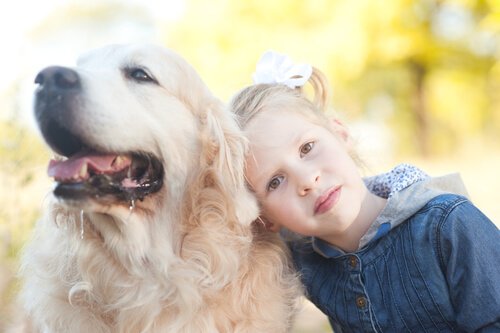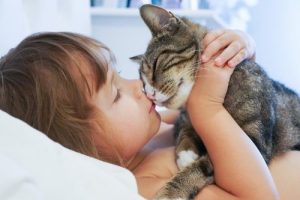My Children and Pets

In today’s age, the internet is often distracting people from the beauties of life. Therefore, it would be good to remember that there are many benefits for children to grow up with a domestic animal. By doing so, you can help your children and pets form an inseparable bond. Below, you will find out why you shouldn’t let your children grow up with a furry, feathered or scaly friend.
Your children and pets, a good partnership
As long as you have financial means and responsibility to take care of a pet, you should let your children grow up with one or more pets.

There are innumerable studies that indicate that children who grow up around animals, who live in a happy household and have ideal playmates, have a better cognitive, physical and socio-emotional development. For example, they:
- Don’t get sick that often.
- Are more responsible and supportive.
- Learn to relate better to their surroundings.
- Feel more secure of themselves.
- Decrease their chances of having allergies, asthma, and stress.
- Perform more physical activity.
What pet to choose for your children
Although dogs and cats take the cake as being most children’s favorite a pet. Don’t think that your children won’t form a good relationship with the following animals:
- Rabbits
- Fish
- Guinea pigs
- Birds
It would be best for your children to have contact with the animals as of birth. In addition to preventing allergies later in life, you should consider that children at the age of three years will understand that pets aren’t toys anymore.
For this reason, remember to always supervise the games and choose the most appropriate pet for your children.
Your children and pets can become be the best of freinds as long as you influence them your children to love and respect animals. In doing so, your children will grow up with the best playmates they can ever get.
Responsibilities your children should have with pets
According to your child’s age, you can assign different responsibilities. Let them know that their pet isn’t a stuffed animal, but a living creature that needs to be treated well. You must explain to them that must respect animal’s moods and not disturb them when they’re eating or sleeping.
In addition, as your children grow up, you must teach them to take on certain responsibilities with their pets, such as:
- Cleaning the litter box.
- Washing their food and water bowls.
- Giving them food and changing their water on a daily basis.
- Brushing their fur.
- Walking them.
Make sure that living with pets won’t cause any health problems for your children
For your peace of mind, make sure that the contact your children have with the animal doesn’t cause them any health problems.
You should take the animal periodically to the veterinarian for a routine check-up. In addition, you’ll have to deworm them — both internally and externally — and vaccinate them just as the vet advises.
Also, teach your children to wash their hands thoroughly after playing with their pets and not allow them to climb on the head of their bed. Also, you should teach them the importance of keeping home always clean and ventilated when having a pet.
Other issues to keep in mind about children and pets

In the event that you already have a pet and your you’re expecting a baby, you must make sure your pet doesn’t feel jealous. You have to show them that they won’t be replaced with the arrival of the new human in the home.
If the pet was adopted after the birth of your child and your child is old enough to understand, try explain to them that pets aren’t toys and they must respect and take care of them.
Follow these tips and give yourself a pat on the back for allowing your children and pets to become the best of friends.